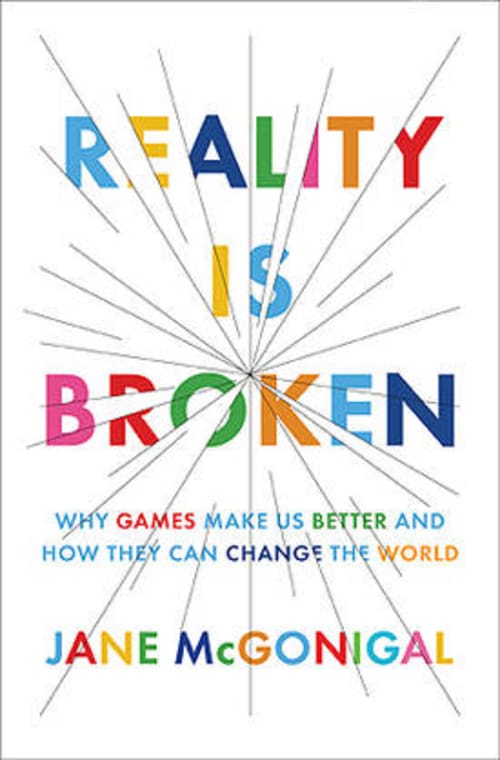Over several months, I’d seen headlines about some woman who argues that video games are going to fix the world. Being a scholar who studies video games, my interest was piqued. So, when my teaching duties ended this spring, I finally dug into the book that has spawned the recent media attention.
The provocatively titled Reality is Broken: Why Games Make Us Better and How They Can Change the World is written by Jane McGonigal, an academic and the director of the inspirationally-named Institute for the Future. McGonigal argues that video games, as a medium, point the way to a healthier society. She organizes the book around a series of fourteen “fixes for reality”—pithy observations on why games are superior to real life. For example, she argues that “compared with games, reality is unproductive. Games give us clearer missions and more satisfying, hands-on work.”
To make her case, she puts forth examples of new games that, she argues, help us improve the human species, paying particular attention to her specialty, Alternate Reality Games (ARGs). ARGs are unusual games that (as she puts it) “organize real-world activity,” such as the recent Investigate Your MP’s Expenses game launched by The Guardian in response to scandalous abuse of reimbursements by politicians. The game encouraged British citizens to examine a mass of real-life unorganized government receipts and identify fishy transactions. Successful finds garnered points and recognition for the players while simultaneously leading to the resignation of over two dozen Members of Parliament and criminal proceedings—20,000 players investigated 170,000 receipts in the first 80 hours.
But this neutral book summary does not do justice to how deeply conflicted I felt while reading Reality is Broken. Rather than trying to muddle through my thoughts in a vaguely coherent manner, I’ve invited two different voices to have a conversation about the book: a gaming enthusiast called the Gamer, and a critical, grumpy scholar called the Curmudgeon.
Gamer: Well I, for one, like this book. It’s invigorating. Video games are a huge part of popular culture. They’re creative and intellectually stimulating, and they build community. But because non-gamers aren’t really excited by most games (which is fine by me—everyone’s different), they don’t experience these positives and tend to denigrate or ignore the video game medium. This is a great book for people like that. McGonigal makes the inner workings and benefits of games easy to understand. On top of that, she takes games seriously, even though they’re usually fun. She persuasively challenges stereotypes—arguing, for example, that games are fun not because they’re easy, but because they make gamers work hard.
Curmudgeon: If you want to improve the image of video games, you’ve got to write a better book than this! It has the bombastic, self-promotional tone of a salesperson who’s imbibed too much of her own Kool-Aid. While many of the games she describes are interesting, they often hardly seem to match her rhetoric of “epic wins” and “missions impossible.” Not only that, but she’s prone to bad logic in spots: the example of a single game somehow “irrefutably shows that gamers are, on the whole, happier when a good game also does real-world good.”
Gamer: Listen, grumpy, these are critiques of the execution of the book, but not of its core arguments. Yes, the book is a sales pitch. She’s a visionary—what did you expect? But that doesn’t prevent her from displaying phenomenally creative, divergent, playful, and inspirational thinking. Sure, some examples are a bit overblown, but some are wonderful, such as the SuperBetter game she created to help keep a positive attitude and enlist support from friends and families while recuperating from a serious concussion. And yes, a few individual arguments are questionable, but the overall point is clear and fair: if you apply the principles of game design outside of normal, self-contained games, you can encourage some very positive social developments.
Curmudgeon: But even some of the core parts of the argument are poor. One of her biggest mistakes is that she idealizes games, gamers, and game culture. To hear her talk, you’d think that picking up a controller makes you a kind of saint. Gamers like hard work. Gamers value community. Gamers have epic goals and creative vision. You’d think she’s never actually seen gamers in action. Anyone who plays regularly in just about any setting knows very well that she’s only presenting half the picture: gamers can also be cantankerous, vicious, xenophobic, and small-minded. Curiously, she indicates in little asides that she knows about the acknowledged warts in the gaming community. But in the end, much of her argument rests on overplaying the very real strengths of games and gamers and downplaying equally real problems.
Gamer: Again, these critiques qualify the arguments, but they don’t negate the basic point she’s making. Even if games and game-thinking can’t do everything she wants it to do, that doesn’t invalidate the point that in certain circumstances, game-thinking could really help us harness positive social forces that would go undeveloped with more traditional methods.
Curmudgeon: But I’m not at all sure that even in this limited form her arguments are all sunshine and light. Let’s leave aside her hidden behaviourist framework that easily justifies social engineering (give me experience points, and I’ll salivate). At core, her grand vision for social engineering through games overestimates the powers of games. Gamers might like hard work in video games, spending dozens of hours to complete challenging scenarios. But in the end, games are addictive and inspiring because they are too easy. McGonigal says games spawn optimism, dedication, and many other positive things—but they are able to do so precisely because they simplify. In order to work, games need defined rules and a clear scope—something that real life rarely has. Even the most complicated love and dating simulator ever created is simpler and easier to manage than the real thing. Once you take games out of their confines and into the real world, they’re not going to work the same way. She skilfully argues that they might be useful for solving problems that can be broken into highly defined and compartmentalized segments, but it will be much harder to harness games to address big picture, highly complicated problems like global warming or international refugee crises. Work that is good and necessary is often not clearly defined and not very fun.
But on its deepest level, the biggest problem I have with this book is its ideological underpinnings. This is, at base, a book about addressing the classic complaints of being human. Intentionally or not, she sets up an essentially religious narrative. “Compared with games, reality is pointless and unrewarding.” “Compared with games, reality is lonely and isolating.” “Compared with games, reality is unsustainable.” Substitute “games” with “life with Jesus” or “nirvana” or some other well-established religious ideal, and the statements are eerily familiar. That doesn’t invalidate the arguments any more than it invalidates Christianity or Buddhism, but it does mean that for McGonigal, heaven is happiness, and games are our saviour. I find that exceptionally troubling. I love games too, but they’ll be proven, in the end, to be as hollow moral redeemers as electricity, the telegraph, the suburb, and every other would-be saviour technology.
Gamer: I think you’re right, but I don’t think that invalidates everything she said. You don’t have to believe that personal contentment is the end goal of life in order to introduce valuable gameplay into novel situations. Games are not a cure-all, and yes, if we used them for everything, that’d feel pretty manipulative—but even she admits that games aren’t for everyone in all situations. Take away the overblown rhetoric and religious overtones, and you’ve got a fundamentally valuable and inspirational call.
Curmudgeon: A call that only sets people up to be disappointed, and thus fundamentally undercuts what it tries to achieve.
Gamer: Well, I guess we’ll just have to agree to disagree.
Curmudgeon: That’s really difficult when we’re the same person.
Gamer: Tell me about it.


